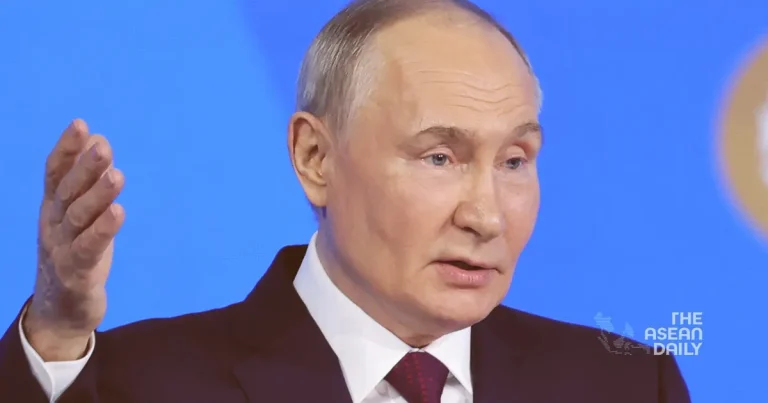19-6-2024 (HANOI) Russian President Vladimir Putin is scheduled to arrive in Vietnam on Wednesday, June 19, marking his first visit to the country in over a decade. This two-day state visit comes as Moscow grapples with international condemnation and isolation following its controversial invasion of Ukraine.
Putin’s visit underscores Russia’s strategic interests in Southeast Asia, highlighting Vietnam as one of its enduring allies in the region. The Russian leader aims to fortify bilateral relations by enhancing cooperation in defence, energy, trade, and financial transactions, amidst ongoing geopolitical turbulence.
The timing of the visit, noting its proximity to the recent Ukraine peace summit in Switzerland, from which Russia was excluded. “Putin wants to show the world that Western efforts to isolate Russia have not succeeded, and that Russia still has allies globally, including in Asia,” Storey said.
The visit follows closely on the heels of Putin’s arrival in Pyongyang, marking his first visit to North Korea in 24 years. There, he pledged to bolster trade and security relations with the reclusive, nuclear-armed state, positioning Russia as a counterbalance to US influence in the region.
Vietnam’s warm reception of Putin has drawn sharp rebukes from the United States, which recently upgraded its relations with Hanoi. In a statement to CNA, a spokesperson for the US Embassy in Hanoi criticised the visit, arguing that no country should provide Putin with a platform to legitimise his actions in Ukraine.
“Allowing Putin to travel freely risks normalising Russia’s blatant violations of international law and sends a dangerous message that such atrocities can occur with impunity,” the spokesperson asserted. “There must be accountability for those responsible for war crimes.”
Vietnam’s relationship with Russia dates back to the Soviet era, when Moscow’s support was pivotal during Vietnam’s struggles for independence and reunification. The Vietnam Military History Museum in Hanoi vividly showcases this alliance, displaying Soviet-made missile systems and aircraft alongside wreckage of American planes from the Vietnam War.
Nguyen Dat Phat, vice-chairman of the Vietnam-Russia Friendship Association, highlighted the historical significance of Soviet support. “The Soviet Union’s assistance was crucial during our resistance war. We needed weapons, ammunition, and fuel,” he explained. Today, Vietnam continues to show solidarity with Russia, having abstained from recent UN votes condemning the invasion of Ukraine.
During his visit, Putin is expected to focus on strengthening security and defence ties, as well as enhancing cooperation in energy and trade. Discussions will likely explore ways to circumvent international sanctions, including potential currency transactions within the banking sector to facilitate business payments.
Russia remains a key supplier of major defence equipment for Vietnam, crucial for maintaining its sovereignty in the South China Sea. Despite a decline in Russian arms sales due to increased competition and US sanctions, Vietnam still relies heavily on Russian military supplies.
Storey noted that Russia has been seeking support from countries to which it has supplied arms, requesting assistance in transferring munitions, particularly those in short supply. “North Korea has already sent millions of rounds of ammunition to Russia, but Vietnam has so far refrained,” he said. “Vietnamese leaders are likely hesitant to take any action that could be seen as prolonging the conflict.”
The visit may result in significant defence agreements, particularly concerning the sale of firearms and other military equipment. While Vietnam has diversified its arms procurement since the mid-2010s, its dependence on Russian spare parts, munitions, and upgrades remains.
Storey highlighted the challenges posed by extensive Western sanctions on Russia, which have undermined its reliability as a defence supplier. Nevertheless, he believes Vietnam’s reliance on Russia is likely to persist for years. “The key question is whether any new defence agreements will cover existing equipment or involve the purchase of new arms from Russia,” Storey said. “Such decisions could strain relations with Washington, which has urged countries to cease buying Russian arms or face potential sanctions.”
Another critical topic on the agenda is Vietnam’s prospective membership in the BRICS group of major emerging economies, which includes Brazil, Russia, India, China, and South Africa. The group, which recently expanded to include Egypt, Ethiopia, Iran, and the UAE, aims to create an alternative to the US dollar and enhance the influence of emerging economies in global politics. Thailand and Malaysia are also pursuing BRICS membership.
Putin’s visit to Vietnam thus serves as a crucial barometer of Russia’s diplomatic strategy and its efforts to reinforce alliances amid escalating global tensions.




